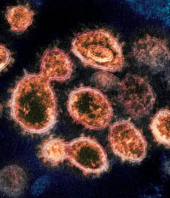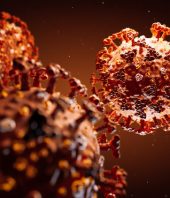Nearly one in five Americans currently suffers from a mental illness, and roughly half of us will be diagnosed with one at some point in our lives. Yet, these occurrences may have nothing to do with a genetic flaw or a traumatic event.
Randolph Nesse, a professor of life sciences at Arizona State University, attributes high rates of psychiatric disorders to natural selection operating on our genes without paying heed to our emotional well-being. What’s more, the selective processes took place thousands of years before the unique stresses of modern urban existence, leading to a mismatch between our current environment and the one for which we were adapted.
In his new book, Good Reasons for Bad Feelings: Insights from the Frontier of Evolutionary Psychiatry, Nesse recruits the framework of evolutionary medicine to make a case for why psychiatric disorders persist despite their debilitating consequences. Some conditions, like depression and anxiety, may have developed from normal, advantageous emotions. Others, such as schizophrenia or bipolar disorder, result from genetic mutations that may have been beneficial in less extreme manifestations of a trait. Scientific American spoke to Nesse about viewing psychiatry through an evolutionary lens to help both patients and clinicians.
[An edited transcript of the interview follows.]A big part of your thesis is that some traits of mental disorders can be advantageous or adaptive—a depressed mood, for instance, might be beneficial for us. Where do you draw the line between the normal spectrum of emotion and pathology?
You can’t decide what’s normal and what’s abnormal until you understand the ordinary function of any trait—whether it’s vomiting or cough or fever or nausea. You start with its normal function and in what situation it gives selected advantages. But there are a lot of places where natural selection has shaped mechanisms that express these defenses when they’re not needed, and very often that emotional response is painful and unnecessary in that instance. Then there’s a category of emotions that make us feel bad but benefit our genes. A lot of sexual longings [extramarital affairs or unrequited love], for instance, don’t do us any good at all, but they might potentially benefit our genes in the long run.
So it’s not saying that these emotions are useful all the time. It’s the capacity for these emotions that is useful. And the regulation systems [that control emotion] were shaped by natural selection—so sometimes they’re useful for us, sometimes they’re useful for our genes, sometimes it’s false alarms in the system and sometimes the brain is just broken. We shouldn’t try to make any global generalizations, we should examine every patient individually and try to understand what’s going on.
In the book you suggest that low mood could be advantageous for two very separate reasons. One of the motivators is to shift strategies to escape a situation, and the other is to have people stop striving and conserve energy. How do you reconcile these opposing theories?
It’s intuitively obvious that when an organism, not just a human, is wasting energy trying to pursue a goal and not making progress, it’s best to wait and slow down and not waste energy. Then if nothing works—even when you try to find a new strategy—to give up that goal completely.
Of course for we humans, it’s not always seeking out nuts and fruits and berries. We’re trying to garner social resources, and that creates inordinate complexity and competition. And it’s not so easy to give up looking for a marital partner or give up looking for a job; we can’t just do that. These moods are guiding us to try to put effort into things that are going to work instead of things that are not going to work. That doesn’t mean we should just follow them, but it does mean respecting them more and trying to figure out what they might be telling us about the things we're trying to do in life.
Could treating someone with antidepressants be disadvantageous, then, if low mood is a normal coping mechanism?
Evolutionary psychology I see very much as a subset of evolutionary medicine in general. And one of the most practically useful insights of evolutionary medicine is that we should be analyzing the costs and benefits of blocking every single defensive response, whether it’s fever or pain or nausea or vomiting or cough or fatigue. Usually because of the “smoke detector” principle you can block these things safely. [The principle is Nesse’s theory that an overactive fight-or-flight response that causes false alarms—and potentially an anxiety disorder—is better than an underactive system that fails to alert you to danger and could result in death.]
Some people have said that because I say low mood can be useful, I think we shouldn’t treat it with medications. I say exactly the opposite. Once you know that low mood is usually not helpful even though it’s normal, you go ahead and relieve it however you can.
You talk a lot about genes in the book, but also how we’ve come up short in looking for genes for depression or schizophrenia. What role do you think genes play in the evolutionary model of the mental illness?
First of all, there are two very different categories of illness that should be kept separate. One is the emotional disorders, which are potentially normal, useful responses to situations. And in all such responses, variability and sensitivity are influenced by lots of different genes.
There are also mental disorders that are the most severe ones that are just plain old genetic diseases: bipolar disease and autism and schizophrenia. They’re genetic diseases, and whether you get them or not is overwhelmingly dependent on what genes you have. But why would a strong, inheritable trait that cuts fitness by half not be selected against? I think this is one of the deepest mysteries in psychiatry.
What could be some of the potential benefit of these latter conditions or other uses for these genes?
For bipolar disease, the reduction in the number of offspring is not very great at all, so it might be that there’s not much selection acting there. And what if a tendency to be bipolar resulted in having even more children? What would happen then? Well it [the gene] would become universal, even though it caused bipolar disease. Maybe something like this has already happened. Maybe many of us have tendencies to grand ambitions and mood swings that probably aren’t good for us but might lend to grand successes on occasion, and that might lead to great reproductive success.
Then there’s the “cliff edge” effect, which is the possibility that some traits are pushed very far towards a peak that’s close to a place where fitness collapses for a few percent of the population. This could be a new way of looking at all of these diseases in which we have many genes with small effects. It might be that what we should be looking for is the fitness landscape and not assume that the genes involved are abnormal.
What do you hope patients or clinicians can gain from reading your book?
I find many of my patients feel like they’re abnormal if they are told, “You have an anxiety disorder, you have a depressive disorder.” Talk with them a little bit about the fact that there are advantages to anxiety and that low moods might have meaning. It might not just be something that’s broken in you, it might be that your emotions are trying to tell you something. I think that makes many people feel less like they’re defective.
Source: Scientific American, Full Article






